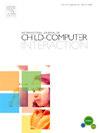Exploring parent self-efficacy in children's digital device use: Understanding shame and self-stigma through a mixed-methods approach
Q1 Social Sciences
International Journal of Child-Computer Interaction
Pub Date : 2024-12-12
DOI:10.1016/j.ijcci.2024.100718
引用次数: 0
Abstract
This study utilized a mixed-methods approach to explore the relationship between shame, parental self-stigma, and parental self-efficacy in managing children's digital device use, while considering societal pressure and social media influence. Data was collected via an online survey administered to parents of school-aged children. The sample included 394 predominantly female Australian parents. Quantitative analyses, including confirmatory factor analysis and structural equation modeling, were complemented by qualitative thematic inductive content analysis. Results indicated a significant mediation effect of self-stigma on the relationship between shame and self-efficacy. Qualitative analysis revealed themes of societal pressure, judgement-based pressure, and social media pressure, highlighting contextual influences on parent self-stigma and self-efficacy. The convergence of quantitative and qualitative findings emphasizes the pivotal role of shame in influencing parental self-efficacy in the digital realm. This comprehensive approach enriches our understanding by illustrating how societal pressures and online influences contribute to feelings of shame and self-stigma among parents. Recommendations include establishing clear digital device guidelines for parents and implementing targeted interventions to mitigate parental shame and self-stigma, thereby enhancing parental self-efficacy in managing children's digital device use. These findings contribute to understanding the psychological dynamics of parenting in the digital age and offer insights to support parents in navigating this evolving landscape.
探索儿童数字设备使用中的父母自我效能感:通过混合方法理解羞耻和自我污名
本研究采用混合方法,在考虑社会压力和社交媒体影响的情况下,探讨了在管理儿童数字设备使用方面羞耻、父母自我耻辱和父母自我效能之间的关系。数据是通过对学龄儿童的父母进行的在线调查收集的。样本包括394名以女性为主的澳大利亚父母。定量分析,包括验证性因子分析和结构方程模型,辅以定性主题归纳内容分析。结果表明,自我耻辱感在羞耻感与自我效能感之间具有显著的中介作用。定性分析揭示了社会压力、基于判断的压力和社交媒体压力的主题,强调了环境对父母自我耻辱感和自我效能感的影响。定量和定性研究结果的融合强调了羞耻在影响数字领域父母自我效能方面的关键作用。这种全面的方法通过说明社会压力和网络影响如何导致父母的羞耻感和自我耻辱感,丰富了我们的理解。建议包括为父母制定明确的数字设备指南,并实施有针对性的干预措施,以减轻父母的羞耻感和自我污名,从而提高父母在管理儿童数字设备使用方面的自我效能感。这些发现有助于理解数字时代养育子女的心理动态,并为父母在这一不断变化的环境中导航提供了见解。
本文章由计算机程序翻译,如有差异,请以英文原文为准。
求助全文
约1分钟内获得全文
求助全文
来源期刊

International Journal of Child-Computer Interaction
Social Sciences-Education
CiteScore
7.20
自引率
0.00%
发文量
73
 求助内容:
求助内容: 应助结果提醒方式:
应助结果提醒方式:


